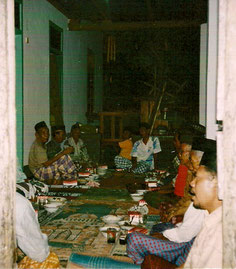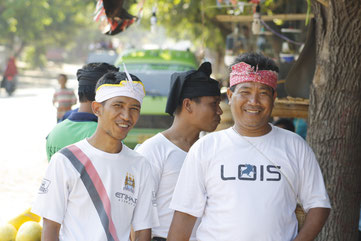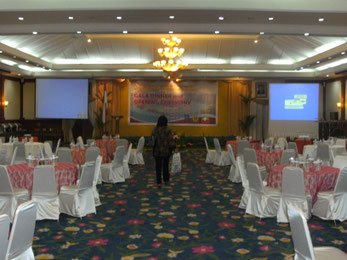
You have already taken the first hurdles on your way to Indonesia and are preparing for initial negotiations with Indonesian partners or customers? The flight is booked, meetings confirmed and the agenda is set?
That your next steps are going well, you should now be prepared that negotiations in Indonesia run somewhat different than in western countries.
This article shows some peculiarities in negotiations with Indonesian partners and customers and provides a brief overview of Dos and Don'ts.
Setting an appointment
Dealing with time is much more relaxed and flexible in Indonesia than in western countries. Speed is usually important, instead, there is serenity. A fixed time agenda is rather rare in meetings. If, then it is more a framework than a fixed run down to be strictly followed . This is indeed unusual and may disturb some, but it also opens up good opportunities to extend an appointment if that seems helpful.
Punctuality is even in Indonesia important, but delays are tolerated - if only because of the often unpredictable traffic. As a Westerner you should still try to be on time and to perceive dates accordingly since this may be regarded as a positive attribute and a sign of appreciation. If you are unpunctual you should be either very important or provide good reasons for your delay.

Appointments with longer lead are often understood as tentative and non-binding and thus may be changed on short notice. On the positive side, that means a certain, sometimes useful flexibility in scheduling and meetings.
It is common to catch up with someone on short notice or even by just showing up at their office. If the person is not available you might be asked to come again later or simply to wait until the person is free to meet you. So always have a good book with you to overcome the time waiting for someone.
Ambiance for meetings
The place of a meeting should be carefully and appropriately selected to the situation. If you are dealing with large Indonesian companies, meetings may be held in their premises. But also meeting rooms in hotels are often booked for meetings. It is also not unusual to meet somewhere in a coffee shop or a nice restaurant in one of the endless malls in Jakarta.
If it is on you to make selection, the hotel your negotiations will take place give a first impression of your status to your negotiation partner. Therefore, avoid "cheap or budget hotels" and pay attention to the good reputation of the house. When negotiating with authorities you will rarely become invited in their offices, for such meetings hotels are often used instead. This is partly because Indonesian government offices are not always representative and prepared for the visit of foreigners.

Very popular is to hold talks by a lunch, dinner or brunch. Here you should leave your Indonesian partners the selection of restaurant and location. They will make sure that here mostly high-class restaurants are chosen to emphasize the importance of the negotiation.
Negotiation process
As already mentioned above, the meeting agenda is very flexible in Indonesia, negotiations follow not really a fixed time line or run down. To us Westerners, some conversations during meetings often seem poorly targeted or even useless and unproductive. There is a lot of showing politeness, beating around the bush or endless small talk. For a business traveler having a tight schedule this may be quite irritating.
However, as with many other things, what in Indonesia counts is not the result. It’s the quality of the relationship between business partners. Negotiations are therefore usually lengthy and require several appointments until the desired result has been reached.

Within your meeting delegation you should discuss the roles (as negotiator, expert, arbitrator, observer and mediator, etc.). Define theses roles well in advance and distribute tasks before the meeting takes place. It is recommended that your team shows up with the same number of participants as your Indonesian negotiation partners does.
Try to find out before the meeting whom your partner will bring along and don’t be surprised if other people join the meeting than agreed on before hand. In Indonesia everything is flexible.
Conflicts and ambiguities
Indonesians are consensual people. Goals of a meeting are to negotiate as long as a result is achieved, which all can agree on. It is not important that the best (technical, financial, etc.) result is achieved. What counts is the relation between the business partners. In the talks important points are frequently repeated. A repetition or summary of what was said signals approval and understatement. Are some points simply ignored or not further discussed shows that they are either not important or it indicates rejection by your partner.
Prolonged silence or an interruption of the meeting are not necessarily negative signs. Indonesians contemplate before they comment on something. Pondering silence is a sign that a statement is considered carefully.

When negotiations stall, it is advisable to take a break. Such a break can take several hours or even days. Don’t worry! This interruptions give you and your partner a chance to continue the talks behind the scenes and solve ambiguities. Interruptions are not taboo and are not a signal for a breakdown of the negotiations.
Are negotiations getting stuck or conflicts arise, search for the support of an Indonesia expert or adviser. He can discuss as a neutral instance with the Indonesian partner about the problems and help to get clarification so that all partners can keep their face and negotiations can continue.
Dos and don'ts in negotiations
Dos
- Select and setup your negotiating team properly beforehand
- Take time for introduction at the beginning of the meeting and learn about your business partners by doing small talk
- Exchange business cards (give and receive them with both hands, place them in front of you at your desk to remember the persons)
- Make small talk, make small talk, make small talk (also personal issues may be addressed)
- Be patient and take time (it takes as long as it lasts)
- Show agreement and importance on topics by repeating them
- Stay calm, relax and keep cool at all times
Don'ts
- Don’t lose patience and rush trough the agenda
- Don’t interrupt your business partners when they contemplate
- Don’t just talk about objectives and business
- Don’t forcefully stick to agenda and let the meeting flow
- Don’t express agreement or disagreement expressed directly
- Don’t be pushy, but don’t let your self be pushed
- Don’t show negative emotions, don’t hurry and don’t become loud
If you want to learn more about cultural impacts when doing business in Indonesia, visit one of our training or book a workshop for your company.
Check out our Indoconsult Training page.
Contact our training team at training@indoconsult.de for more information and details.
Of course, those information can not be an assurance that your negotiations become a success all along the line, and for sure it does not replace individual consulting and advice. But if you follow these points you will be on a good way for your negotiation success in Indonesia.
